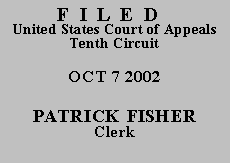

| UNITED STATES OF AMERICA,
JOHN T. TUCKNESS, |
No. 01-3358
( D.C. No. 00-CV-4085-RDR) |
$ 5,291.78, representing $ 2,695.48 in loan principal and $ 2,596.30 in accrued interest. (Doc. No. 65.)
On appeal, Tuckness claims that he did not receive a copy of the Magistrate Judge's Report and Recommendation in time to lodge his objections. (Aplt. B. at v.) Tuckness points to an entry on the district court's docket noting that a certified letter containing a copy of the document had been returned as unclaimed. (Doc. No. 65.) He thus argues that he could not have waived his right to appeal the district court's order adopting it. (Aplt. B. at v); see also Moore v. United States, 950 F.2d 656, 659 (10th Cir. 1991) (establishing that an appellant waives his right to appellate review when he fails to file timely objections to a magistrate judge's Report and Recommendation).
The district court, however, found that Tuckness had been properly served. (Doc. No. 64.) It noted that the Magistrate Judge's Report and Recommendation had in fact been served on Tuckness in three ways: by regular mail, by first class mail, and by certified mail with return receipt requested. (Id.) All parties and counsel had been advised that they had been given ten (10) days from the date of the receipt of any copy of the Report and Recommendation to file and serve their written objections to it. (Id.) The parties had also been advised that failure to file and serve objections in a timely manner might result in their waiver of any right to appeal. (Id.) Finally, the district court found no indication that Tuckness could be entitled to special tolling provisions as he was not an infant, an incompetent person, or a person serving abroad in the military. (Doc. No. 66.)
We will only set aside a district court's finding of fact if a party can show it was clearly erroneous. Fed. R. Civ. P. 52(a); United States v. United States Gypsum Co., 333 U.S. 364, 395 (1948). Tuckness has made no such showing here. Although the certified letter in question was never claimed, Tuckness could have received the Magistrate Judge's Report and Recommendation by either of the two other methods. Moreover, this was not the first time Tuckness had been selectively difficult to serve. On at least two other occasions when Tuckness had not responded to service through standard methods, the U.S. Marshal Service had been required to serve Tuckness in person. (Doc. Nos. 6, 32, 35, 66.) These events at critical junctures in the case are to be contrasted with the occasions at which Tuckness chose to be responsive to service by standard methods. (See, e.g., Doc. Nos. 23, 38; Doc. Nos. 39, 40 (establishing a pattern of responses to court documents when mailed); see also Doc. No. 44 (recording notice of standard service on Tuckness)). Furthermore, Tuckness should have been fully cognizant he risked entry of default judgment if he chose not to be responsive to court procedure. Indeed, default judgment had already been entered against him once before and he had been aware enough of the process to have mounted a successful challenge against it.
As we hold that it was not clear error for the district court to have found Tuckness had been properly served, Tuckness has waived his right to appellate review by failing to object in a timely manner to the Magistrate Judge's Report and Recommendation. Moore, 950 F.2d at 659. Accordingly, we AFFIRM the district court's dismissal of his appeal.
ENTERED FOR THE COURT
David M. Ebel
Circuit Judge
*.After examining appellant's brief and the appellate record, this panel has determined unanimously that oral argument would not materially assist the determination of this appeal. See Fed. R. App. P. 34(a)(2) and 10th Cir. R. 34.1(G). The case is therefore ordered submitted without oral argument. This Order and Judgment is not binding precedent, except under the doctrines of law of the case, res judicata, and collateral estoppel. The court generally disfavors the citation of orders and judgments; nevertheless, an order and judgment may be cited under the terms and conditions of 10th Cir. R. 36.3.